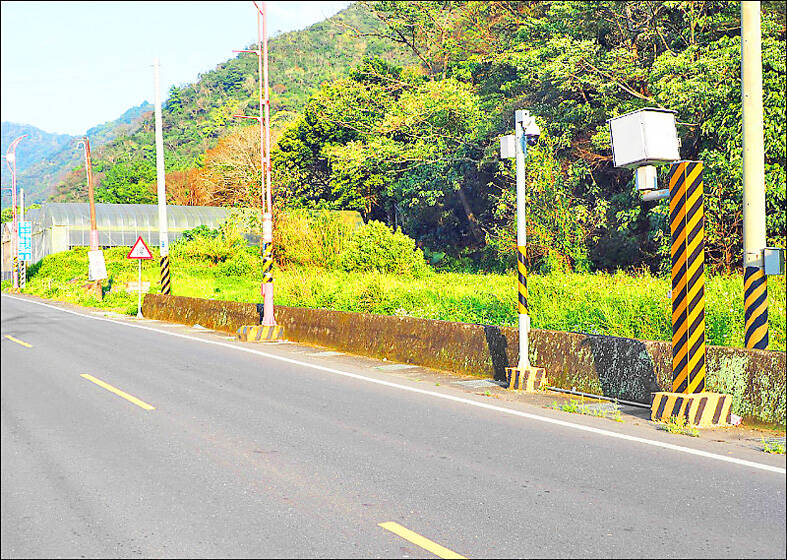Speeding remains the primary reason drivers face having their licenses suspended, the Directorate-General of Highways (DGH) said yesterday, amid a debate over new demerit rules for illegal stopping.
The demerit point system was amended on June 30 to change the number of points required before a person’s license is suspended from six points over six months to 12 points over a year. It also adjusted the definition of what constitutes a demerit point.
Since the amendment, there have been about 10 times more traffic infringements involving demerits than were recorded last year, data from the agency showed.

Photo: Taipei Times
After the amendment, more than 70 percent of traffic infringements were reported by pedestrians or other drivers, whereas beforehand, police officers had to pull over an offending driver for them to receive a demerit point, Monitoring and Surveillance Division head Wei Wu-sheng (魏武盛) said.
The amendment allows traffic infringements called in by the public to count toward demerit points, Wei added.
From June 30 to Thursday last week, there were 1.01 million incidents of speeding, 905,560 incidents of illegal stopping, 676,433 incidents of people changing lanes or turning without signaling, 458,619 incidents of people running red lights and 456,984 incidents of people driving into oncoming lanes, agency data showed.
The data showed that 800,230 people received demerit points for contravening traffic regulations, 944 of whom had reached the maximum of 12 points per year and had their driver’s licenses suspended.
In contrast, demerit points were given out for 74,390 traffic infringements last year, with 32,531 people racking up more than six points and having their licenses suspended, the agency said.
The amendments enable people to pay to attend traffic safety courses to deduct demerit points, Wei said.
Drivers who have accrued six points in one year may pay NT$600 to attend a three-hour course to deduct two demerit points from their record, he said.
From June 30 to Nov. 30, there were 1,156 drivers who paid to attend such courses, he added.

The US government has signed defense cooperation agreements with Japan and the Philippines to boost the deterrence capabilities of countries in the first island chain, a report by the National Security Bureau (NSB) showed. The main countries on the first island chain include the two nations and Taiwan. The bureau is to present the report at a meeting of the legislature’s Foreign Affairs and National Defense Committee tomorrow. The US military has deployed Typhon missile systems to Japan’s Yamaguchi Prefecture and Zambales province in the Philippines during their joint military exercises. It has also installed NMESIS anti-ship systems in Japan’s Okinawa

‘WIN-WIN’: The Philippines, and central and eastern European countries are important potential drone cooperation partners, Minister of Foreign Affairs Lin Chia-lung said Minister of Foreign Affairs Lin Chia-lung (林佳龍) in an interview published yesterday confirmed that there are joint ventures between Taiwan and Poland in the drone industry. Lin made the remark in an exclusive interview with the Chinese-language Liberty Times (the Taipei Times’ sister paper). The government-backed Taiwan Excellence Drone International Business Opportunities Alliance and the Polish Chamber of Unmanned Systems on Wednesday last week signed a memorandum of understanding in Poland to develop a “non-China” supply chain for drones and work together on key technologies. Asked if Taiwan prioritized Poland among central and eastern European countries in drone collaboration, Lin

ON ALERT: Taiwan’s partners would issue warnings if China attempted to use Interpol to target Taiwanese, and the global body has mechanisms to prevent it, an official said China has stationed two to four people specializing in Taiwan affairs at its embassies in several democratic countries to monitor and harass Taiwanese, actions that the host nations would not tolerate, National Security Bureau (NSB) Director-General Tsai Ming-yen (蔡明彥) said yesterday. Tsai made the comments at a meeting of the legislature’s Foreign Affairs and National Defense Committee, which asked him and Minister of National Defense Wellington Koo (顧立雄) to report on potential conflicts in the Taiwan Strait and military preparedness. Democratic Progressive Party (DPP) Legislator Michelle Lin (林楚茵) expressed concern that Beijing has posted personnel from China’s Taiwan Affairs Office to its

BACK TO WORK? Prosecutors said they are considering filing an appeal, while the Hsinchu City Government said it has applied for Ann Kao’s reinstatement as mayor The High Court yesterday found suspended Hsinchu mayor Ann Kao (高虹安) not guilty of embezzling assistant fees, reducing her sentence to six months in prison commutable to a fine from seven years and four months. The verdict acquitted Kao of the corruption charge, but found her guilty of causing a public official to commit document forgery. The High Prosecutors’ Office said it is reviewing the ruling and considering whether to file an appeal. The Taipei District Court in July last year sentenced Kao to seven years and four months in prison, along with a four-year deprivation of civil rights, for contravening the Anti-Corruption